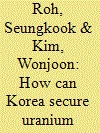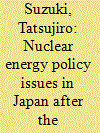|
|
|
Sort Order |
|
|
|
Items / Page
|
|
|
|
|
|
|
| Srl | Item |
| 1 |
ID:
101400


|
|
|
|
|
| Publication |
2011.
|
| Summary/Abstract |
Nuclear energy comes back to the discussions on the world stage as an energy source that does not contribute to global warming during production process. It can be chosen as the main source of power generation in some countries or complement the energy matrix in others. In this context, there is the need to develop new technologies for the management of radioactive waste generated by the production process. Final repositories for spent fuel are not yet in commercial operation, and techniques for fuel reprocessing have been developed, because after use, the fuel still has materials that produce energy. Some countries already use reprocessing, and develop research to make it more secure and more competitive, while others prefer to adopt policies to prevent developments in this area due to the problem of nuclear proliferation. In another line of research, new reactors are being developed in order to reduce the amount of waste in energy production and some will be designed to work in closed loop, recycling the materials generated.
|
|
|
|
|
|
|
|
|
|
|
|
|
|
|
|
| 2 |
ID:
133092


|
|
|
|
|
| Publication |
2014.
|
| Summary/Abstract |
South Korea is heavily dependent on energy resources from other countries and nuclear energy accounts for 31% of Korea's electric power generation as a major energy. However, Korea has many limitations in uranium enrichment and spent fuel reprocessing under the current Korea-U.S. nuclear agreement, although they are economically and politically important to Korea due to a significant problems in nuclear fuel storages. Therefore, in this paper, we first examine those example countries - Japan, Vietnam, and Iran - that have made nuclear agreements with the U.S. or have changed their agreements to allow the enrichment of uranium and the reprocessing of spent fuel. Then, we analyze those countries' nuclear energy policies and review their strategic repositioning in the relationship with the U.S. We find that a strong political stance for peaceful usage of nuclear energy including the legislation of nuclear laws as was the case of Japan. In addition, it is important for Korea to acquire advanced technological capability such as sodium-cooled fast reactor (SFR) because SFR technologies require plutonium to be used as fuel rather than uranium-235. In addition, Korea needs to leverage its position in nuclear agreement between China and the U.S. as was the case of Vietnam.
|
|
|
|
|
|
|
|
|
|
|
|
|
|
|
|
| 3 |
ID:
090073


|
|
|
|
|
| Publication |
2009.
|
| Summary/Abstract |
The Korean National Energy Committee has recently adopted a new National Energy Basic Plan according to which the electricity generated by nuclear power plants is to increase from the current 35.5% of total electricity production to 59% by 2030. This large increase in nuclear power will inevitably accelerate the accumulation of spent fuel; if the direct disposal option is pursued, spent fuel arisings in Korea are expected to exceed 100,000 tHM in 2100. It is estimated that the country will require between 10-22 disposal sites, each with an area equal to the Gyeongju low- and intermediate-level radioactive waste (LILW) disposal site, to accommodate this amount of spent fuel. However, considering Korea's geographic profile, securing this number of sites will be almost impossible, and will ultimately create a serious problem for the sustainability of nuclear energy in the country. In view of this dilemma, this paper recommends that the volume of Korean nuclear waste for disposal be significantly reduced, and offers sodium fast reactor (SFR)-based recycling as a potentially viable solution.
|
|
|
|
|
|
|
|
|
|
|
|
|
|
|
|
| 4 |
ID:
142009


|
|
|
|
|
| Summary/Abstract |
The 2011 Fukushima nuclear accident has become a turning point for Japan, creating loss of public trust not only in nuclear safety but in overall energy policy. More than 80 percent of the public wants to phase out nuclear power eventually. On April 11, 2014, the Japanese government adopted a new National Energy Strategy that declares its intention to reduce dependence on nuclear energy while considering it one of the important base-load electricity sources. Regardless of the future of nuclear energy, Japan needs to face five key policy issues: spent fuel management, plutonium stockpile management, radioactive waste disposal, human resources management, and restoration of public trust. I discuss these critical issues and possible policy alternatives that Japan should pursue.
|
|
|
|
|
|
|
|
|
|
|
|
|
|
|
|
|
|
|
|
|